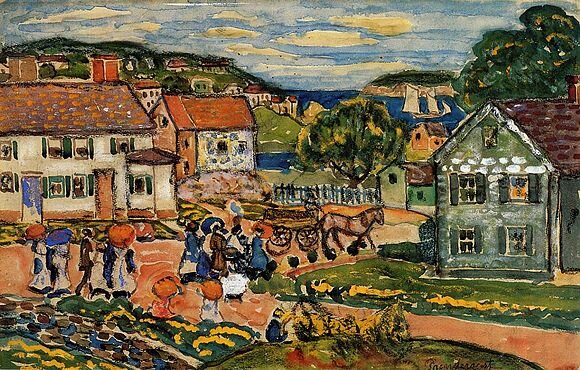
Shedding season
“Summer is the time when one sheds one's tensions with one's clothes, and the right kind of day is jeweled balm for the battered spirit. A few of those days and you can become drunk with the belief that all's right with the world.”
— Ada Louise Huxtable (1921-2013), famed architectural writer. She spent about half of each year in a ranch house in Marblehead, on the Massachusetts North Shore.
Huxtable: Shedding clothes and tensions; 'not a perfect thing anywhere'
At Old Orchard Beach, in southern Maine
“Summer is the time when one sheds one’s tensions with one’s clothes, and the right kind of day is jeweled balm for the battered spirit. A few of those days and you can become drunk with the belief that all’s right with the world.’’
— Ada Louise Huxtable (1921-2013), famed architectural critic, on vacationing in New England, in the September 1977 New York Times
Although the New York City-born and -bred Huxtable was most associated with that city, she spent much of her time in Marblehead, Mass., where she had a modest one-story house.
She wrote in The Wall Street Journal in 2011, explaining her “Full confession: I am no fan of perfection”:
“I have spent a good part of my life in a small New England town with a priceless American heritage where such over-the-top perfectionism simply does not exist. There are offbeat and off-kilter compromises by carpenter-builders trying to follow the examples in English pattern books in the new towns of the New World, dealing with costs and shortages, substituting materials, inventing their own details. The 18th-Century house built for the richest man in town is made of wood cut in blocks to simulate stone that was not available. This place is genuine; its buildings retain the hallmarks of its history, something that can never be imitated or reproduced, and there is not a perfect thing anywhere — for which I am eternally grateful.”
“Marblehead” (watercolor), by Maurice Prendergast (1914), in the Museum of Fine Arts, Boston
Crowded Marblehead Harbor in high summer
The Amoskeag complex in 1911, during its textile-making heyday
Her biggest impact on New England probably came in her 1968 New York Times article “Lessons in Urbicide,” about the proposed destruction of the vast Amoskeag mill complex on the Merrimack River in Manchester, N.H.
She wrote: “The story of the destruction of the Amoskeag mill complex that has formed the heart of Manchester, N.H., for over a hundred years has a terrible pertinence for the numberless cities committing blind mutilation in the name of urban renewal. . . . We are making a dull porridge of parking lots and cheap commercialism, to replace the forms and evidence of American civilization.”
As it turned out, the complex was saved and repurposed.
Drunk on delusion
"Summer is the time when one sheds one's tensions with one's clothes, and the right kind of day is jeweled balm for the battered spirit. A few of those days and you can become drunk with the belief that all's right with the world."
- Ada Louise Huxtable





